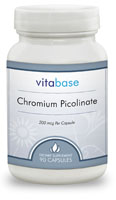| Chromium picolinate is a nutritional supplement that works to increase the efficiency of insulin to optimal levels. This popular nutritional supplement is a combination of the element chromium and picolinic acid. Chromium is a naturally-occurring mineral,
trace amounts of which are found in everyday foods like meat, poultry, fish, and whole-grain breads. Dietary supplementation of chromium to normal individuals has been reported to lead to improvements in glucose tolerance, serum lipid concentrations, including high-density lipoprotein cholesterol, insulin and insulin binding.
Chromium is a mineral required in small quantities by the body. It enables insulin to function normally and helps the body process (metabolize) carbohydrates and fats. The primary function of insulin is to transport glucose to the body’s cells in order to provide energy that facilitates cell functioning. Chromium is best known for its role in the metabolism of glucose, with research showing that it may improve the ability of glucose-intolerant people to remove excess sugar from their blood after eating. The principle energy sources for the body are glucose and fatty acids. Because it appears to alter the breakdown of fats in the diet, chromium may also be beneficial for individuals with some types of high cholesterol.
Chromium depletion results in biologically ineffective insulin and compromised glucose metabolism. Chromium depletion is characterized by the disturbance of glucose, lipid and protein metabolism and by a shortened lifespan. When chromium is deficient, the body must rely primarily on lipid metabolism to meet its energy requirements, resulting in the production of excessive amounts of acetyl-CoA and ketone bodies. Some of the acetyl-CoA is converted to increased cholesterol biosynthesis, resulting in hypercholesterolemia. Diabetes mellitus is characterized in large part by glycosuria, hypercholesterolemia, and often ketoacidosis.
Chromium picolinate is an exceptionally bioactive source of chromium. Consequently, it has a number of most significant beneficial effects, including improved insulin metabolism and body lipid control. Internal absorption and availability of dietary chromium highly depend on the chemical states of chromium. Although chromium itself has no biochemical function, it becomes physiologically active in the living bodies, when complexed with the organic compounds. Since the conventional chromium supplements in the form of inorganic salts of chromium, yeast extracts or nicotinic acid-chromium complexes are absorbed poorly in the digestive tracts, such malabsorption leads to chromium deficiency in the living bodies. The absorption of chromium ions into the small intestine is inhibited by competing metals such as zinc, copper, manganese and vanadium, etc. Under this condition, the administration of chromium in the form of chromium picolinate complex was suggested.
In addition, picolinic acid in chromium picolinate is known to be a metabolite of amino acids, produced from tryptophan in the liver, kidney and pancreas of animals, and also known to be a physiological carrier for zinc, copper and chromium ions during their transport from the small intestine to the blood. Picolinic acid is also a structural isomer of nicotinic acid which is one of the constituents of GTF derived from yeast. |
 Chromium is an essential mineral. Low chromium levels may result in an increase in blood sugar, triglycerides and cholesterol. Chromium picolinate is one of the most popular forms of chromium available and is used in hundreds of different supplements. It is a combination of the element chromium and picolinic acid. The addition of picolinic acid aids in the ability of chromium to be absorbed. Click here for more information.
Chromium is an essential mineral. Low chromium levels may result in an increase in blood sugar, triglycerides and cholesterol. Chromium picolinate is one of the most popular forms of chromium available and is used in hundreds of different supplements. It is a combination of the element chromium and picolinic acid. The addition of picolinic acid aids in the ability of chromium to be absorbed. Click here for more information.